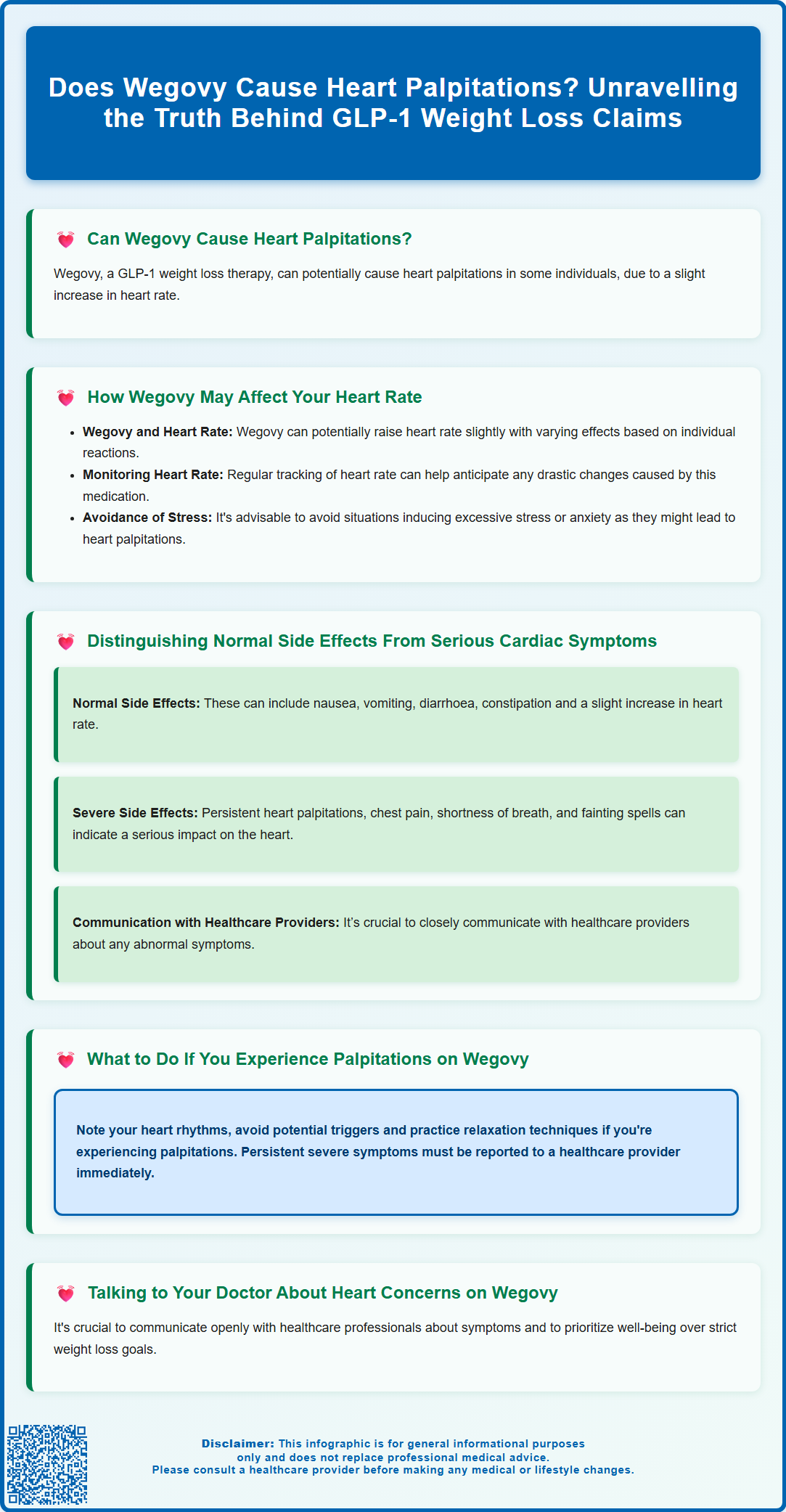Wegovy (semaglutide 2.4 mg) is a GLP-1 receptor agonist licensed in the UK for weight management in adults with obesity or overweight with comorbidities. Does Wegovy cause heart palpitations? While palpitations are not listed as a common side effect in UK prescribing information, some patients may perceive the modest heart rate increase (1–4 beats per minute) associated with Wegovy as palpitations. Understanding the cardiovascular profile of this medication, recognising concerning symptoms, and knowing when to seek medical advice are essential for safe use. This article examines the evidence on Wegovy and heart palpitations, helping patients and clinicians make informed decisions.
Summary: Palpitations are not listed as a common adverse effect of Wegovy in UK prescribing information, though some patients may perceive the modest heart rate increase (1–4 beats per minute) as palpitations.
- Wegovy (semaglutide 2.4 mg) is a GLP-1 receptor agonist licensed for weight management in UK adults with BMI ≥30 kg/m² or ≥27 kg/m² with comorbidities.
- Clinical trials show a mean heart rate increase of 1–4 beats per minute, which is generally clinically insignificant in healthy individuals.
- Palpitations accompanied by chest pain, severe breathlessness, dizziness, or fainting require urgent medical assessment.
- Dehydration from gastrointestinal side effects may indirectly contribute to palpitations through electrolyte imbalances in susceptible patients.
- The SELECT trial demonstrated cardiovascular benefit in patients with established heart disease, showing approximately 20% reduction in major adverse cardiovascular events.
- Regular monitoring of heart rate and blood pressure is advisable during Wegovy treatment, particularly during dose escalation phases.
Table of Contents
What Is Wegovy and How Does It Work?
Wegovy is the brand name for semaglutide 2.4 mg, a prescription medicine licensed in the UK for weight management in adults with obesity (BMI ≥30 kg/m²) or those who are overweight (BMI ≥27 kg/m²) with at least one weight-related comorbidity. It belongs to a class of medications called glucagon-like peptide-1 (GLP-1) receptor agonists, which were originally developed for type 2 diabetes management but have demonstrated significant efficacy in promoting weight loss.
The mechanism of action centres on mimicking the naturally occurring hormone GLP-1, which is released from the intestine in response to food intake. Semaglutide binds to GLP-1 receptors in multiple tissues throughout the body, including the pancreas, gastrointestinal tract, and brain. In the pancreas, it stimulates insulin secretion in a glucose-dependent manner whilst suppressing glucagon release, thereby improving glycaemic control. Within the gastrointestinal system, it slows gastric emptying, which prolongs the sensation of fullness after eating.
Perhaps most importantly for weight management, semaglutide acts on appetite-regulating centres in the hypothalamus, reducing hunger signals and food cravings. This multifaceted approach leads to reduced caloric intake and subsequent weight loss. Clinical trials have demonstrated that patients taking Wegovy alongside lifestyle modifications can achieve substantial weight reduction compared to placebo.

Recognising Heart Palpitations While Taking Wegovy
Heart palpitations are described as an awareness of one's heartbeat, which may feel like the heart is racing, pounding, fluttering, or beating irregularly. Patients often report sensations of their heart 'skipping a beat' or beating too forcefully in the chest, neck, or throat. These sensations can occur at rest or during activity and may last from seconds to several minutes.
Regarding Wegovy specifically, palpitations are not listed as a common adverse reaction in the UK Summary of Product Characteristics (SmPC). However, increased heart rate is a recognised adverse reaction, with clinical trials showing a mean increase of 1-4 beats per minute. Some patients may perceive this heart rate increase as palpitations. The pivotal STEP trials, which evaluated semaglutide for weight management, did not identify palpitations as a common adverse effect, though individual patient experiences may vary.
When taking Wegovy, patients should be aware of accompanying symptoms that warrant medical attention. Palpitations associated with chest pain, severe breathlessness, dizziness, fainting, or profuse sweating require urgent assessment, as these may indicate more serious cardiac conditions. Similarly, palpitations that are persistent, progressively worsening, or significantly impacting daily activities should be evaluated by a healthcare professional.
Palpitations can have many causes unrelated to medication, including thyroid disorders, anaemia, fever, stress, anxiety, caffeine, alcohol, nicotine, and certain decongestants or stimulants. The gastrointestinal effects of Wegovy, particularly nausea and vomiting, could potentially lead to dehydration and electrolyte imbalances, which might indirectly contribute to palpitations in susceptible individuals. If you experience concerning symptoms, contact your GP, call NHS 111 for advice, or seek emergency care if symptoms are severe.
What to Do If You Experience Heart Palpitations on Wegovy
If you develop heart palpitations whilst taking Wegovy, the appropriate response depends on the severity and associated symptoms. For isolated, brief episodes without concerning features, it is reasonable to monitor the situation whilst ensuring adequate hydration and avoiding known triggers such as excessive caffeine, alcohol, or stress. However, you should contact your GP or prescribing clinician to report these symptoms, as they may wish to review your medication and overall cardiovascular health. They might also consider temporarily pausing dose escalation or adjusting your current dose if symptoms are significant.
Seek immediate medical attention by calling 999 or going to A&E (Emergency Department) if palpitations are accompanied by chest pain or tightness, severe shortness of breath, loss of consciousness or near-fainting, sudden confusion, or symptoms suggestive of stroke. These features may indicate serious cardiac events requiring urgent investigation and management. For concerning but non-emergency situations, NHS 111 can provide guidance on appropriate next steps.
For non-urgent but persistent palpitations, arrange a routine GP appointment for clinical assessment. Your doctor will likely take a detailed history, including the frequency, duration, and triggers of palpitations, as well as reviewing your medication list and cardiovascular risk factors. Physical examination will include blood pressure measurement, heart rate assessment, and cardiac auscultation. Initial investigations typically include a 12-lead electrocardiogram (ECG) to evaluate heart rhythm and identify any abnormalities.
Depending on findings, further investigations may be warranted. Blood tests can assess thyroid function, electrolyte levels, and full blood count, as abnormalities in these parameters can precipitate palpitations. If palpitations are intermittent, ambulatory ECG monitoring such as a 24-hour Holter monitor or event recorder may be arranged to capture episodes. Your clinician will also review whether Wegovy should be continued, temporarily suspended, or discontinued based on the overall clinical picture. In some cases, referral to cardiology may be appropriate, particularly if an underlying arrhythmia is suspected or if you have pre-existing cardiovascular disease.
Other Cardiovascular Effects of Wegovy
The cardiovascular profile of semaglutide has been extensively studied, with generally favourable outcomes. The SELECT trial, published in the New England Journal of Medicine in 2023, demonstrated that semaglutide significantly reduced major adverse cardiovascular events in patients with established cardiovascular disease and overweight or obesity, representing a landmark finding for GLP-1 receptor agonists in cardiovascular risk reduction. This trial showed approximately 20% reduction in cardiovascular death, non-fatal myocardial infarction, and non-fatal stroke compared to placebo. However, it's important to note that cardiovascular risk reduction is not currently included in the UK marketing authorisation for Wegovy.
As documented in the SmPC and European Public Assessment Report (EPAR), a common cardiovascular effect observed with Wegovy is a modest increase in resting heart rate, typically by 1-4 beats per minute on average. This effect is consistent across GLP-1 receptor agonists and is thought to relate to increased sympathetic nervous system activity or reduced vagal tone. Whilst this increase is generally clinically insignificant in healthy individuals, patients with pre-existing tachyarrhythmias or significant cardiac disease should be monitored appropriately.
Blood pressure effects are generally beneficial, with many patients experiencing modest reductions in both systolic and diastolic blood pressure, likely secondary to weight loss and improved metabolic parameters. However, the gastrointestinal adverse effects of Wegovy, particularly nausea, vomiting, and diarrhoea, can occasionally lead to dehydration, which might cause orthostatic hypotension or compensatory tachycardia in susceptible individuals.
Based on clinical trials and post-marketing data to date, there has been no signal of increased risk of serious arrhythmias or sudden cardiac death with Wegovy, though pharmacovigilance continues. The product information does not list cardiac arrhythmias as a recognised adverse effect. Patients with a history of pancreatitis or severe gastrointestinal disease should be counselled about specific risks. Those with diabetic retinopathy, particularly if they have type 2 diabetes with pre-existing retinopathy and experience rapid improvement in blood glucose levels, require careful monitoring. Regular assessment of heart rate and blood pressure is advisable, particularly during dose escalation. Any patient with concerning cardiovascular symptoms should undergo thorough assessment, and the decision to continue Wegovy should be individualised based on the balance of benefits and risks in each clinical scenario.
Scientific References
- Wegovy 0.25 mg, FlexTouch solution for injection in pre-filled pen - Summary of Product Characteristics (SmPC).
- Semaglutide for managing overweight and obesity. Technology appraisal guidance [TA875].
- Semaglutide and Cardiovascular Outcomes in Obesity without Diabetes.
- Once-Weekly Semaglutide in Adults with Overweight or Obesity.
Frequently Asked Questions
Is increased heart rate a common side effect of Wegovy?
Yes, Wegovy commonly causes a modest increase in resting heart rate, typically 1–4 beats per minute on average. This increase is generally clinically insignificant in healthy individuals but should be monitored in patients with pre-existing cardiac conditions.
When should I seek medical help for palpitations while taking Wegovy?
Seek immediate medical attention (call 999) if palpitations occur with chest pain, severe breathlessness, loss of consciousness, or stroke symptoms. For persistent or worsening palpitations without emergency features, contact your GP for assessment.
Does Wegovy increase the risk of serious heart problems?
Clinical trials show no increased risk of serious arrhythmias or sudden cardiac death with Wegovy. The SELECT trial actually demonstrated approximately 20% reduction in major cardiovascular events in patients with established heart disease and obesity.
The health-related content published on this site is based on credible scientific sources and is periodically reviewed to ensure accuracy and relevance. Although we aim to reflect the most current medical knowledge, the material is meant for general education and awareness only.
The information on this site is not a substitute for professional medical advice. For any health concerns, please speak with a qualified medical professional. By using this information, you acknowledge responsibility for any decisions made and understand we are not liable for any consequences that may result.
Heading 1
Heading 2
Heading 3
Heading 4
Heading 5
Heading 6
Lorem ipsum dolor sit amet, consectetur adipiscing elit, sed do eiusmod tempor incididunt ut labore et dolore magna aliqua. Ut enim ad minim veniam, quis nostrud exercitation ullamco laboris nisi ut aliquip ex ea commodo consequat. Duis aute irure dolor in reprehenderit in voluptate velit esse cillum dolore eu fugiat nulla pariatur.
Block quote
Ordered list
- Item 1
- Item 2
- Item 3
Unordered list
- Item A
- Item B
- Item C
Bold text
Emphasis
Superscript
Subscript












